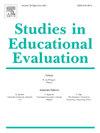探讨中国利益相关者对学校检查标准在展示教育质量方面的看法:意见的差异是否反映了不同的学校背景?
IF 2.6
2区 教育学
Q1 EDUCATION & EDUCATIONAL RESEARCH
引用次数: 0
摘要
本研究调查了在一个中国城市的不同学校背景下,利益相关者对学校检查标准的重要性和相关性的看法是否存在差异,以及可能解释任何已发现差异的潜在因素。采用混合方法设计,包括在10所学校进行利益相关者问卷调查(n = 364),然后进行访谈(n = 13)。研究结果表明,学校之间确实存在教师对学校检查指标的优先级的差异,特别是在一所城市表现不佳的学校和所有其他学校之间存在统计学上的显著差异。来自城市低绩效学校的访谈证据与当地政策制定者和其他学校教师的观点进行了对比。总体而言,调查结果表明,教师和当地利益相关者的更多参与,承认当地情况,加强教学和学习过程,特别是针对弱势学校,可以更好地促进检查过程和学校改进。本文章由计算机程序翻译,如有差异,请以英文原文为准。
Exploring Chinese stakeholders’ perceptions of school inspection criteria in demonstrating educational quality: Do discrepancies in opinions reflect different school contexts?
This study investigates whether discrepancies exist in stakeholder perceptions of the, importance and relevance of school inspection criteria for demonstrating educational, quality in different school contexts in one Chinese city, as well as the underlying factors, that may explain any identified discrepancies. A mixed-methods design was employed, involving a stakeholder questionnaire conducted in 10 schools (n = 364) followed by, interviews (n = 13). The findings demonstrated that differences do exist between, schools in teachers’ priorities for school inspection indicators and in particular there, were statistically significant differences between one urban low-performing school and all other schools. The interview evidence from the urban low-performing school was, contrasted with perspectives from local policy makers and teachers in other schools., Overall, the findings demonstrate that inspection processes and school improvement, could be better promoted by more involvement of teachers and local stakeholders’, voices, acknowledging local contexts and strengthening teaching and learning, processes, particularly for disadvantaged schools.
求助全文
通过发布文献求助,成功后即可免费获取论文全文。
去求助
来源期刊

Studies in Educational Evaluation
Multiple-
CiteScore
6.90
自引率
6.50%
发文量
90
审稿时长
62 days
期刊介绍:
Studies in Educational Evaluation publishes original reports of evaluation studies. Four types of articles are published by the journal: (a) Empirical evaluation studies representing evaluation practice in educational systems around the world; (b) Theoretical reflections and empirical studies related to issues involved in the evaluation of educational programs, educational institutions, educational personnel and student assessment; (c) Articles summarizing the state-of-the-art concerning specific topics in evaluation in general or in a particular country or group of countries; (d) Book reviews and brief abstracts of evaluation studies.
 求助内容:
求助内容: 应助结果提醒方式:
应助结果提醒方式:


